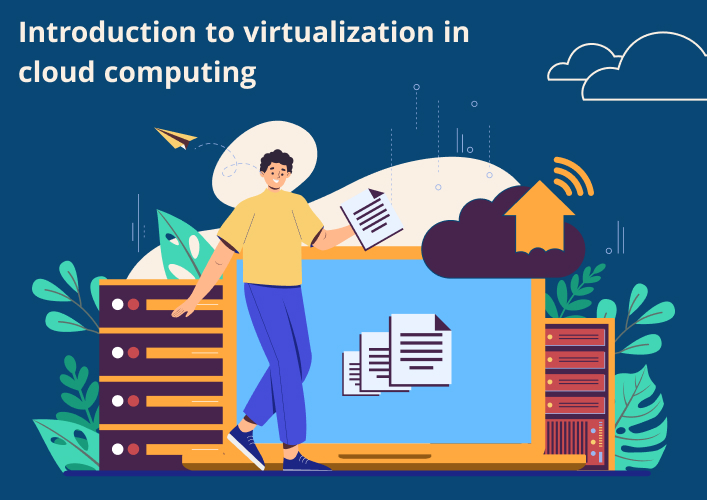Introduction to virtualization in cloud computing

Virtualization, in its simplest form, is the process of building an environment in a computer network, operating system, server, storage device, or desktop computer. Through the use of virtualization, several departments or companies may share a single physical instance of an application or resource. Virtualization has seen tremendous growth and success in the commercial world in recent years.
Using virtualization, businesses can take advantage of cloud computing’s multi-layered commuting strategy and get the most out of their infrastructure. Thus, it is adopted by global IT companies. Let’s discuss further the benefits of virtualization in cloud computing in detail.
Advantages of virtualization in cloud computing
With so many potential benefits, it’s natural that virtualization is often used in large-scale cloud-based systems. Here are some of the advantages of virtualization in cloud computing.
- The simplicity with which information may be moved between servers and gadgets is one of virtualization’s biggest benefits. Finding the information you need no longer requires an entire set of physical hard disks. You may move a whole computer across sites without physically relocating any hardware when you use virtualized storage and desktop solutions. This is a huge money and time-saver.
- Hardware-based ecosystems need regular upkeep and software revisions. To speed up software upgrades and strengthen security, virtualization eliminates these problems by making available an infinitely replicating virtual system on demand.
- Because of virtualization in cloud computing, a complete system failure may be avoided. This is due to the fact that components of a virtualized infrastructure may be kept running independently. Bugs, crashes, and other problems may be minimized or eliminated when testing in a simulated environment.
- It’s not overstating things to say that virtualization in cloud computing facilitates centralized administration, allowing for efficient operation of all available resources. Additionally, virtualization’s speed and robustness come into play when you consider how simple it is to duplicate and clone your virtual machines.
Once the right resources are made available, the advantages of virtualization in cloud computing may be maximized. Hypervisor is often used in the virtualization process. Virtualization of your computer’s processing, storage, and network resources is made possible by this application.
Characteristics of virtualization in cloud computing
- Whether it’s software or an OS, virtualization must provide a totally independent and isolated environment. Cloud-based software often communicates with an abstraction layer that gives them access to the underlying infrastructure. The host is protected against attacks thanks to the virtualization process. As a result, the virtual environment’s goal is to regulate the client program’s performance through resource fine-tuning.
- Whether the company uses a cluster of servers or just one computer, virtualization plays a key role in cloud computing by isolating and isolating applications and data on a single host system.
- Virtualization’s ability to let several machines share a single set of resources means that you may combine numerous hosts into a single, parent system.
- A successful virtualization procedure will improve the host’s control over the guest’s application execution without the user seeing any difference. Cloud-based virtual machines also monitor and filter guest program activity, preventing malicious actions that aren’t legitimate from being performed.
- The many benefits of virtualization on cloud platforms are not available when working with traditional, on-premises servers. There are several scalability advantages to using virtualization, including improved fault tolerance, availability, and uptime.
- The main aspect of virtualized machines, which allow you to establish a distinct computing environment on the same host, is the ability to share resources across such environments. In this way, you may reduce the number of online servers and therefore, your energy bill.
Conclusion
In conclusion, virtualization is a cornerstone of cloud computing and has several benefits. It improves efficiency, scalability, security, and cost-effectiveness. Virtualization also helps with computing, testing and development, and disaster recovery. The entire potential of this revolutionary technology can only be realized by adopting virtualization in the cloud, therefore it is crucial to today’s IT architecture.
FAQs
What is virtualization in cloud computing?
How does virtualization improve security in cloud computing?
Can virtualization be used for disaster recovery in the cloud?
How does virtualization contribute to cost savings in cloud computing?
What is the impact of virtualization on energy efficiency and the environment?
Shivangi is a passionate Copywriter at Alian Software with expertise in technical copywriting. She shares information that is easy to understand regarding business, technology, and trends.